Top Rankings
Honey Creek Community School District ranks among the top 20% of public school district in Michigan for:
Category
Attribute
Overall Rank
Highest overall rank (Top 5%)
Math Proficiency
Highest math proficiency (Top 10%)
Reading/Language Arts Proficiency
Highest reading/language arts proficiency (Top 1%)
Science Proficiency
Highest science proficiency (Top 10%)
Student Attention
Lowest student:teacher ratio (Top 1%)
For the 2025 school year, there is 1 public school serving 249 students in Honey Creek Community School District. This district's average testing ranking is 10/10, which is in the top 5% of public schools in Michigan.
Public School in Honey Creek Community School District have an average math proficiency score of 52% (versus the Michigan public school average of 34%), and reading proficiency score of 77% (versus the 46% statewide average).
Minority enrollment is 32% of the student body (majority Hispanic), which is less than the Michigan public school average of 37% (majority Black).
Overview
This School District
This State (MI)
# Schools
1 School
3,509 Schools
# Students
249 Students
1,376,331 Students
# Teachers
22 Teachers
82,379 Teachers
Student : Teacher Ratio
11:1
11:1
District Rank
Honey Creek Community School District, which is ranked within the top 5% of all 851 school districts in Michigan (based off of combined math and reading proficiency testing data) for the 2021-2022 school year.
Overall District Rank
#35 out of 866 school districts
(Top 5%)
(Top 5%)
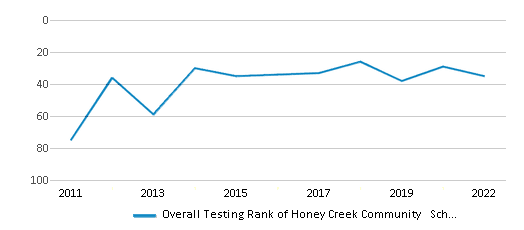
Math Test Scores (% Proficient)
50-54%
34%
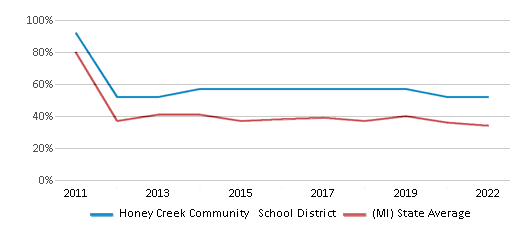
Reading/Language Arts Test Scores (% Proficient)
75-79%
45%
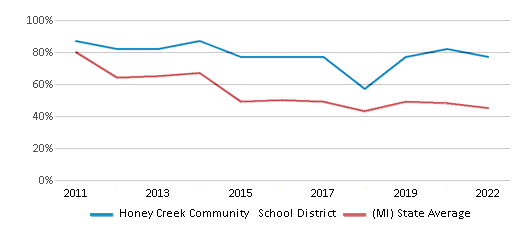
Science Test Scores (% Proficient)
50-59%
38%
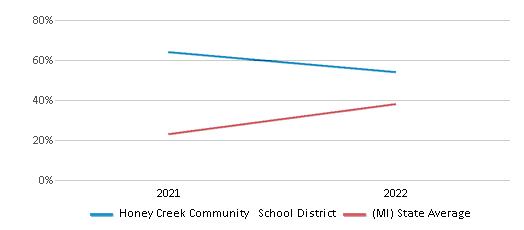
Students by Ethnicity:
Diversity Score
0.51
0.56
# American Indian Students
n/a
8,574 Students
% American Indian Students
n/a
1%
# Asian Students
13 Students
50,770 Students
% Asian Students
5%
4%
# Hispanic Students
24 Students
125,678 Students
% Hispanic Students
10%
9%
# Black Students
10 Students
244,434 Students
% Black Students
4%
18%
# White Students
170 Students
871,645 Students
% White Students
68%
63%
# Hawaiian Students
n/a
1,208 Students
% Hawaiian Students
n/a
n/a
# Two or more races Students
32 Students
73,219 Students
% of Two or more races Students
13%
5%
Students by Grade:
# Students in PK Grade:
-
-
# Students in K Grade:
26
110,461
# Students in 1st Grade:
27
100,790
# Students in 2nd Grade:
29
102,777
# Students in 3rd Grade:
28
100,401
# Students in 4th Grade:
28
101,847
# Students in 5th Grade:
26
101,136
# Students in 6th Grade:
33
102,120
# Students in 7th Grade:
25
103,285
# Students in 8th Grade:
27
102,692
# Students in 9th Grade:
-
114,669
# Students in 10th Grade:
-
112,993
# Students in 11th Grade:
-
109,871
# Students in 12th Grade:
-
109,317
# Ungraded Students:
-
3,972
District Revenue and Spending
The revenue/student of $11,622 in this school district is less than the state median of $18,510. The school district revenue/student has declined by 9% over four school years.
The school district's spending/student of $11,558 is less than the state median of $17,693. The school district spending/student has declined by 9% over four school years.
Total Revenue
$3 MM
$25,476 MM
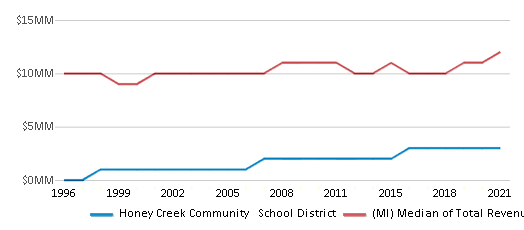
Spending
$3 MM
$24,351 MM
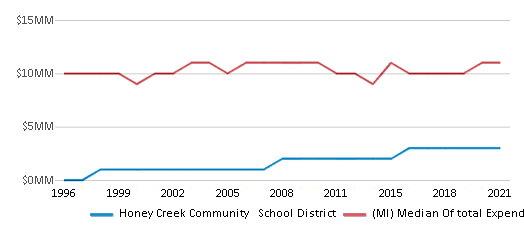
Revenue / Student
$11,622
$18,510
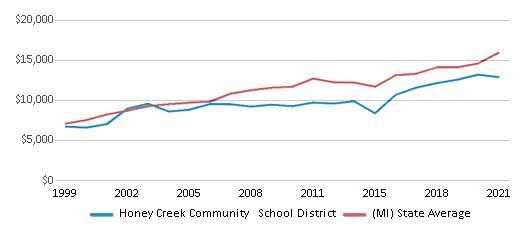
Spending / Student
$11,558
$17,693
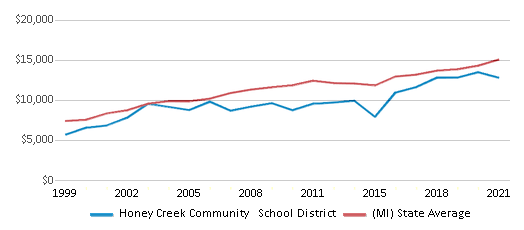
Best Honey Creek Community School District Public Schools (2025)
School
(Math and Reading Proficiency)
(Math and Reading Proficiency)
Location
Grades
Students
Rank: #11.
Honey Creek Community School
Charter School
(Math: 50-54% | Reading: 75-79%)
Rank:
Rank:
10/
Top 10%10
1735 S Wagner Rd
Ann Arbor, MI 48103
(734) 994-2636
Ann Arbor, MI 48103
(734) 994-2636
Grades: K-8
| 249 students
Frequently Asked Questions
How many schools belong to Honey Creek Community School District?
Honey Creek Community School District manages 1 public schools serving 249 students.
What is the rank of Honey Creek Community School District?
Honey Creek Community School District is ranked #39 out of 851 school districts in Michigan (top 5%) based off of combined math and reading proficiency testing data for the 2021-2022 school year. This district ranks in the top 20% of Michigan school districts for: Highest overall rank (Top 5%), Highest math proficiency (Top 10%), Highest reading/language arts proficiency (Top 1%), Highest science proficiency (Top 10%) and Lowest student:teacher ratio (Top 1%)
What is the racial composition of students in Honey Creek Community School District?
68% of Honey Creek Community School District students are White, 13% of students are Two or more races, 10% of students are Hispanic, 5% of students are Asian, and 4% of students are Black.
What is the student/teacher ratio of Honey Creek Community School District?
Honey Creek Community School District has a student/teacher ratio of 11:1, which is lower than the Michigan state average of 17:1.
What is Honey Creek Community School District's spending/student ratio?
The school district's spending/student of $11,558 is less than the state median of $17,693. The school district spending/student has declined by 9% over four school years.
Recent Articles

What Is A Charter School?
Explore the world of charter schools in this comprehensive guide. Learn about their history, how they operate, and the pros and cons of this educational innovation. Discover key facts about charter schools, including admission policies, demographics, and funding, as well as what to look for when considering a charter school for your child.

10 Reasons Why High School Sports Benefit Students
Discover the 10 compelling reasons why high school sports are beneficial for students. This comprehensive article explores how athletics enhance academic performance, foster personal growth, and develop crucial life skills. From improved fitness and time management to leadership development and community representation, learn why participating in high school sports can be a game-changer for students' overall success and well-being.

February 05, 2025
Understanding the U.S. Department of Education: Structure, Impact, and EvolutionWe explore how the Department of Education shapes American education, from its cabinet-level leadership to its impact on millions of students, written for general audiences seeking clarity on this vital institution.





